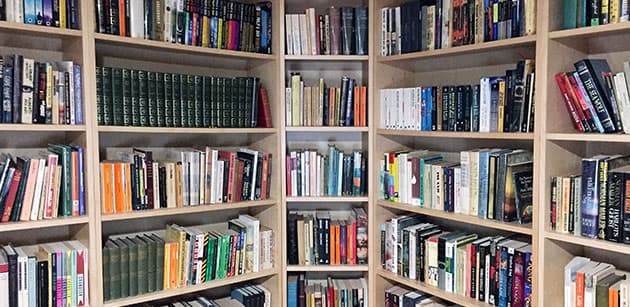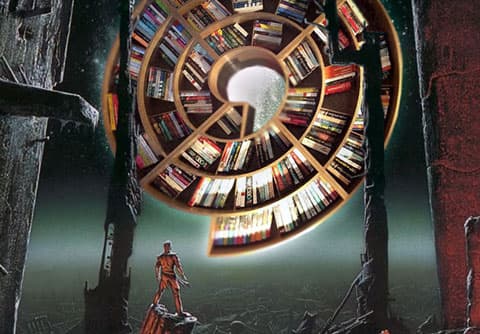What Does 'Greatest' Even Mean?
What's so great about these books? • Is genre writing great? • The biases
Latest revision: March 26, 2025
The terms "great" and "greatest" are applied liberally in discussion of The Greatest Literature of All Time and our other lists. What do we and our hundreds of sources that helped in selecting titles for our list mean by them?
Works may be considered great in the traditional sense of having stood the test of time, becoming enduring monuments of creative achievement.
Or they may be called great in the colloquial sense of "What a great read!"
But then the G-word may be used in many other ways. A writer's work may be great in the impact it has in its time. It may be great in its influence on other authors. Or in popularity. Or in sales. Or in the insights it gives into a certain place, time or culture. In its use of language. In its artistic innovation or technical virtuosity.
And then there's my personally favourite idea of greatness. Great literature is writing you can revisit throughout your life, experiencing it anew and discovering something worthwhile—about the book, the author, the world or yourself—each time you read it.
What's so great about these books?
No one of these above definitions is used as the sole criterion for our Greatest lists.
But none of these definitions are outside the scope of the list either.
Any or all of the ways people talk of greatness are taken into account for each title.
I don't always agree with others about what's great. In some cases, critics and scholars have praised as masterpieces works I dislike. For example, James Joyce's Ulysses is is often hailed as the greatest novel of the twentieth century. I have read it five times (yeah, really) and have come to the conclusion it is a brilliantly innovative, torturous waste of time. Except for that wonderfully raunchy final section. Yes I said yes I do yes I do adore it.
A book that often places near the top of readers' favourite lists are Ayn Rand's Atlas Shrugged. In my opinion, this is a dreadfully written novel of cardboard characters and implausible narrative, popular due to its rousing message of individualism and its support by adherents to Rand's laissez-faire capitalist philosophy.
Similar remarks may be made about George Orwell's Animal Farm, whose critical and popular support may be due more to its political allegory than to its literary qualities.
Note that I am not opposed to political content. Personally, I welcome it. But in these examples from Rand and Orwell I don't think it's enough to overcome other shortcomings.
Nonetheless, all these above-mentioned titles are included on Greatest lists despite my personal misgivings, because large numbers of other people—readers, writers, critics or scholars—think they're great.
Even taking into account differing ideals of greatness, the Greatest Literature list does not necessarily include all deserving literary titles. Many superior works may have never become known outside of small circles, perhaps have never been published. Or they may have been published and forgotten because they didn't speak to people in a particular way at a particular time. Their timing was off. Or their authors simply had bad luck. Whatever the reason, some works' excellent qualities have not led them to become famous.
So, this is not a list of works chosen as the greatest ever. It's a list of works that have become recognized as such—whatever criterion of greatness has been applied by a significant portion of humanity.
Is genre writing great?
Included on the Greatest Literature lists are many works that scholars and critics turn up their noses at but a good portion of the public have embraced. This exemplifies the divide that occurs in other fields between high or fine art on one hand and popular or folk art on the other hand.
In literature these disagreements occur for the most part over modern works that may be considered genre writing: science fiction, fantasy, detective stories, mysteries, thrillers, romances, horror, historical fiction, and so on.
Yet it could be argued that some supposed genre writers—Ray Bradbury, Raymond Chandler, Daphne Du Maurier, Stephen King—have had as great impacts on contemporary writing, even contemporary life, as any authors with higher literary credentials. They may be as meaningful to readers today as the gripping stories of Beowulf, Song of Roland and King Arthur's knights were to people of the Middle Ages, or as the thrilling tales of Alexandre Dumas, Edgar Allan Poe and Robert Louis Stevenson were in the nineteenth century—old "genre" works that have since merged into the literary canon.
On the other hand, some wildly popular writing of the past that might be considered "genre" have faded into obscurity. We don't know what surprises future evaluations of literature have in store for us. (A favourite moment in the movie Star Trek: The Voyage Home is when Captain Kirk notes swearing was common back in the twentieth century: "You'll find it in all the literature of the era. Jacqueline Susann, the novels of Harold Robbins." To which Spock nods, "Ah, the giants.")
In short, popular works should not be excluded merely because they are considered genre writing as opposed to true "literary" works.
Time will tell whether they, like all the other great titles on the list, will endure.
The biases
As written about elsewhere, a weakness of the Greatest Literature list, may be that it still emphasizes Western literature available in English. Extensive efforts have been made to consider the greatest creative literature from all parts of the world, from all cultures and in many original languages, but a natural bias likely remains. We continue to work on this.
The biggest imbalance evident in the list though is that twentieth-century writing accounts for more entries than all other periods put together. Partly this is because, indeed, more literature was produced in that century than in any previous era. It is also true that contemporary and recent literature often speaks to us more directly than older works and thus seems "better" to those of us living now. Also, at least some of this preponderance of modern lit on the lists can be attributed to simple ignorance of older works. This imbalance is expected to be redressed somewhat as we gain longer perspective on works of the past century.
Another modern bias should be admitted: novels are cited far more frequently than any other kinds of works, such as short stories, poetry or drama. This reflects the fact that novels constitute our most popular literary form.
This wasn't always the case. At one time poetry was the writing that any iterate person knew. Stories told orally or acted out dramatically have been the chief entertainment at various times and places. But for the past century at least, the novel has been far and away the most popular literary form around the world. This is not to excuse the list's possible neglect of any great poems, stories or plays. It is simply to point out we are not as familiar with them as we are with novels.
Drama is an unusual case as a "literary" form because plays are generally not written to be read. In the days before movies and television, people were more familiar with drama live on stage than in print. Even today the quality of a play depends on its theatrical performance more than on its literary values. In general, dramas selected for this list are those that offer the greatest rewards as literature—that is, as read on the page. The success of a play on stage—like the success of a movie or television drama based on a book—is only partially relevant for our literary purposes here.
In future, the list could even include an exceptional film or television screenplay if a great one should be published and read as literature. Just as, in recent years, graphic novels—"comics" to some of us—have been put into contention for our lists.
The Greatest Literature of All Time is an ongoing project. Sources continue to be consulted. New and new kinds of works are read, read about and discussed. Over time, humanity changes its tastes—even its tastes as to what constitutes great literature.
— Eric



